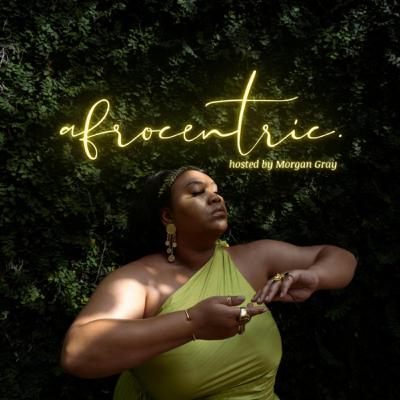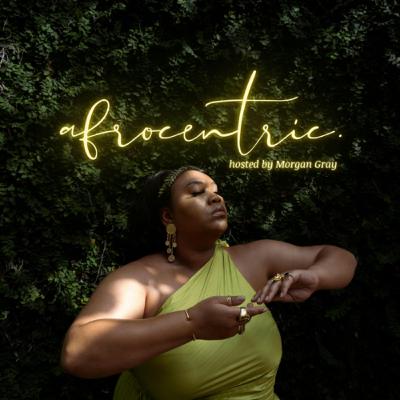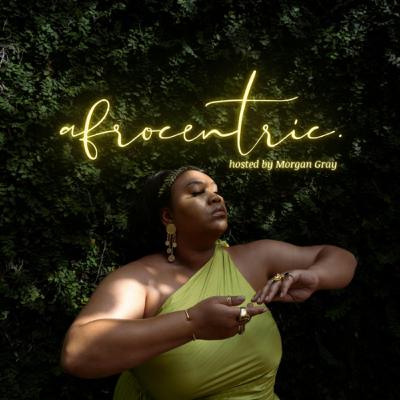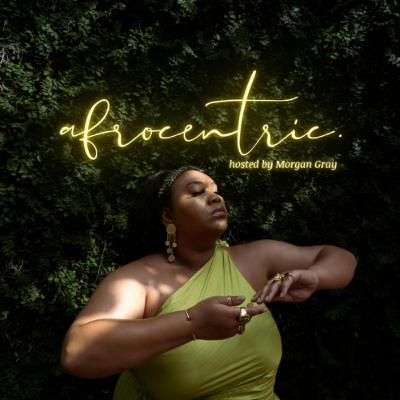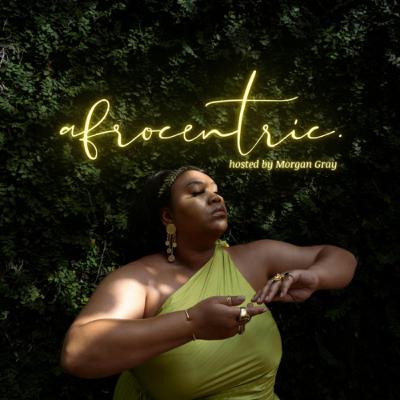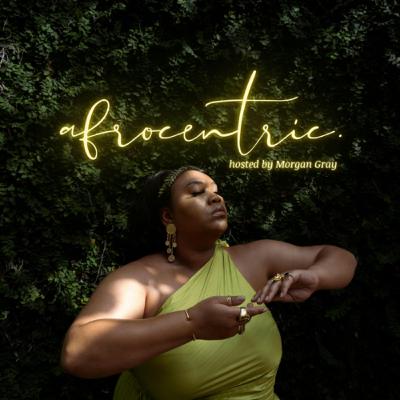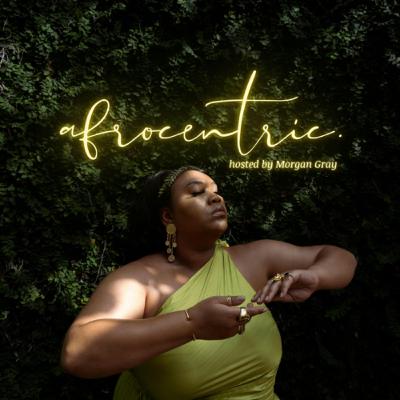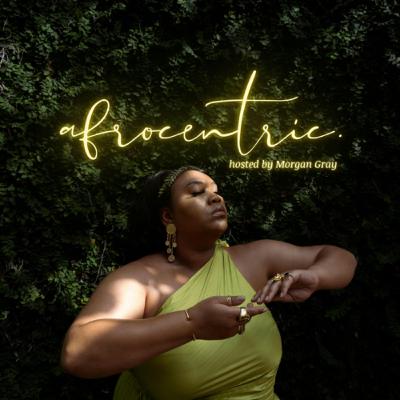Discover Afrocentric.
Afrocentric.

 Afrocentric.
Afrocentric.
Author: Morgan Gray
Subscribed: 3Played: 77Subscribe
Share
© Morgan Gray
Description
Afrocentric /ˌafrōˈsentrik/: Regarding African or Black culture as preeminent. Hosted by Morgan Gray, this educational podcast adopts an Afrocentric worldview, placing African/Black cultural experiences at the forefront. Through insightful discourse and incisive analysis, it deconstructs Eurocentric narratives, offering authentic, empowering alternatives. Confront societal biases, celebrate Black excellence, while evolving your perspective through an Afrocentric lens. Navigate predominantly white spaces with cultural pride and self-assurance. Join the movement. Embrace the movement.
102 Episodes
Reverse
In part three of The Afrocentric Podcast’s Black History Month series, "Resist the White Devil and He Shall Flee," host Morgan dives deep into the critical intersections of Black economics, colonization, and resistance. This episode, centered on capitalism and Black economic warfare, continues the series’ exploration of Black resilience and liberation by focusing on the ways Black communities have historically resisted systemic oppression through economic empowerment and institution building.
Joined by economist Ben Parker, Morgan unpacks how Black people have created thriving financial institutions, businesses, and communities despite being systematically excluded from white-dominated systems. The conversation highlights pivotal moments in Black economic history, such as the wealth of Mansa Musa’s empire and the rise and destruction of Black Wall Street. These stories illuminate a legacy of resilience that continues to inspire resistance today.
Ben also shares his personal experiences navigating both Black and white spaces in the field of economics, offering insight into how he maintains his authenticity while resisting pressures to assimilate. His reflections underscore the ongoing challenges faced by modern Black leaders, entrepreneurs, and institutions as they work to reclaim economic power in a world that often seeks to erase or undermine their efforts.
As part three of this powerful series, this episode serves as both a history lesson and a call to action. It challenges listeners to reflect on the systemic barriers that persist while providing practical advice for building and supporting Black institutions today. By reclaiming economic power through collective efforts, this episode reminds us that resistance is not just about survival—it is about creating a future where Black communities can thrive unapologetically.
In this powerful installment of The Afrocentric Podcast's Black History Month Series, host Morgan Gray sits down with Jeremy Brown, founder of Better Juices LLC, to tackle one of the most pressing issues facing our community: protecting Black children in America.
Jeremy shares his personal journey growing up as a Black child in the American South, offering raw and honest insights into the systemic injustices that threaten the safety and well-being of Black youth. From rising suicide rates and disproportionate incarceration of Black girls to the pervasive dangers of sex trafficking, this episode sheds light on the harsh realities our children face daily.
Together, Morgan and Jeremy explore how societal structures—particularly within education—often fail to safeguard Black children by erasing their history and marginalizing their experiences. Through his work with Better Juices, Jeremy advocates for community health and child wellness, emphasizing the collective responsibility we all share in nurturing and protecting our youth.
This episode isn’t just a conversation; it’s a call to action. Learn how we can resist systemic harm through education, awareness, and grassroots engagement. By fostering resilience and empowerment, we can create safer spaces where Black children can thrive unapologetically.
Tune in now for an authentic, unfiltered discussion that challenges us all to do better for the next generation.
Subscribe to The Afrocentric Podcast today—because protecting our children is protecting our future.
#BlackHistoryMonth #ProtectBlackYouth #ResistTheWhiteDevil
Black History Month serves as a powerful backdrop for this episode of "Resist the White Devil and He Shall Flee: A Black History Month Series." Kendrick D. from KD Creative Arts joins Morgan Gray to delve into the transformative power of critical thinking in Black empowerment. he conversation highlights how critical thinking has historically been used as a tool for resistance and liberation, from dismantling harmful narratives to fostering self-reliance and unity. Kendrick shares insights on how Black communities can develop this skill to challenge societal norms, reclaim cultural identity, and build sustainable
solutions for economic and social progress. Together, they discuss actionable strategies for cultivating critical thinking and applying it to empower individuals and future generations.
They explore how this essential skill has been a cornerstone of resistance and liberation throughout history, challenging harmful narratives and fostering self-reliance and unity within Black communities. The conversation highlights practical strategies for developing critical thinking skills to question societal norms, reclaim cultural identity, and create sustainable solutions for economic and social progress. Kendrick and Morgan emphasize the importance of critical consciousness as a foundation for collective empowerment and resilience, offering actionable insights for individuals to apply in their daily lives and pass on to future generations. This episode not only reflects on the historical significance of critical thinking in Black resistance but also serves as a call to action for listeners to harness this powerful tool in their ongoing struggle for equality and justice.
Dive into a profound exploration of double consciousness with host Morgan Gray and guest Amaya Franklin. This transformative podcast episode delves deep into the intricate concept of double consciousness, revealing how the tension between being Black and American can become a powerful source of personal liberation and understanding.
The discussion unravels the complex experience of navigating racial identity, challenging listeners to view the dual perspective not as a limitation, but as a unique lens of cultural insight and personal strength. Gray and Franklin examine how Black individuals continuously negotiate their sense of self within a society that has historically marginalized their experiences, transforming internal conflict into a nuanced celebration of identity. Listeners will be invited to explore the multifaceted nature of Black existence, understanding how the seemingly contradictory aspects of identity can be harmonized into a powerful, empowered sense of self.
This conversation goes beyond academic analysis, offering personal insights, practical strategies, and emotional depth that illuminate the extraordinary resilience inherent in navigating multiple cultural realities.By confronting the psychological complexities of "two-ness," this podcast provides a compelling narrative of personal growth, cultural understanding, and the ongoing journey of self-discovery. It promises to be an enlightening experience for anyone interested in understanding the rich, intricate landscape of Black identity in the modern world.
In the latest episode of the Afrocentric podcast, "Freestyle 12: Come from Amongst Them and Be Ye Separate," host Morgan Gray delves into the crucial theme of self-reliance and independence within the Black community. Drawing inspiration from the biblical quote in 2 Corinthians 6:17, the episode emphasizes the urgent need for economic and cultural autonomy. Morgan explores the concept of economic divestment, urging the Black community to leverage its collective spending power by withdrawing support from corporations backing Trump's 2024 campaign. This strategy is compared to the impactful Montgomery Bus Boycotts, highlighting the potential for organized economic action to effect change.
The podcast also addresses the importance of cultural self-sufficiency, challenging listeners to examine their dependence on white-dominated institutions, businesses, and cultural norms. Morgan encourages the building of strong, self-reliant Black communities and the re-education of future generations. The episode provides a critical analysis of the resurgence of white supremacist ideologies in contemporary politics, citing both historical and modern examples of systemic racism and violence. Additionally, it tackles the issue of accountability within the Black community, addressing individuals who align themselves with oppressive systems and emphasizing the importance of unity in rejecting harmful alliances.
Throughout the episode, Morgan Gray underscores the urgency for the Black community to foster independence, build internal strength, and resist external pressures that may compromise their cultural integrity and economic power. The overarching message calls for a strategic separation from systems and influences that do not serve the community's best interests, advocating for a path of self-determination and collective empowerment.
This episode serves as a rallying cry for the Black community to come together, reevaluate their relationships with white-dominated institutions, and take concrete steps towards economic and cultural autonomy. Gray's message is clear: it's time for the Black community to "come from amongst them and be separate," focusing on self-reliance, community building, and the preservation of cultural integrity in the face of ongoing challenges.
In the powerful podcast episode "Freestyle 12: Let Everything That Hath Breath", Morgan Gray explores the profound historical and contemporary suppression of Black voices. The narrative traces a devastating journey from the brutal silencing tactics during slavery to modern systemic oppression.
During the era of slavery, African Americans experienced comprehensive linguistic and cultural erasure. Enslaved individuals were systematically denied fundamental communication rights, with slave owners employing horrific methods to prevent gathering, speaking native languages, and maintaining cultural traditions. These tactics went far beyond physical restraint, targeting the very essence of human expression.
The episode highlights shocking mechanisms of control, including the prohibition of native languages, banning of traditional communication methods like drumming, and the use of brutal punishment devices. Enslaved people were often subjected to extreme silencing techniques such as tongue mutilation, iron muzzles, and corporal punishments that prevented them from speaking or communicating freely.
Resistance emerged through creative adaptations like "patting juba", a body percussion technique developed after drums were banned, and preservation of creole languages like Gullah. These strategies represented profound acts of cultural resilience in the face of systematic dehumanization.
Gray connects historical suppression to contemporary challenges, examining modern manifestations like voter suppression, algorithmic bias on social media, and the ongoing stigmatization of Black activism. The episode ultimately serves as a powerful exploration of voice, resistance, and the ongoing struggle for genuine freedom of expression.
In this thought-provoking episode of Afrocentric, host Morgan Gray delves into the complex history of colonization and its modern-day implications, drawing inspiration from Gil Scott-Heron's iconic poem "Whitey on the Moon." She begins by exploring the European colonization of Africa, known as the "Scramble for Africa," highlighting how European powers, driven by technological advancements and economic motivations, rapidly colonized nearly 90% of the African continent between 1870 and 1914. Morgan draws parallels between this historical colonization and the current corporate space race, emphasizing the continuity of imperialist mindsets.
The episode examines the intricate connections between the trans-Atlantic slave trade and European colonization of Africa. Morgan explains how the slave trade systematically weakened African societies over 300 years, setting the stage for subsequent colonization. She discusses how colonizers co-opted local authorities, creating artificial power structures that delegitimized traditional African political institutions.
Shifting focus to contemporary issues, Morgan connects historical colonization with modern space exploration, discussing topics such as the formation of the Space Force, recent alien disclosure discussions, and Elon Musk's SpaceX and its satellite projects. She critically examines how capitalism and greed have led to environmental destruction, disproportionately affecting communities of color. Morgan argues that after depleting Earth's resources, certain entities now aim to colonize space, perpetuating historical patterns of exploitation.
In conclusion, Morgan reflects on the poem's enduring relevance, challenging listeners to consider how historical patterns of colonization and exploitation continue to shape our world today, from Earth to the stars.
In Freestyle 9: White Man Paperwork, host Morgan Gray delves into the term "White Man Paperwork," as articulated by Dr. Umar Johnson, which critiques the bureaucratic processes that disproportionately affect marginalized communities, especially in healthcare and social services. The episode explores the historical context of allyship among African Americans and other minority groups, highlighting their advocacy for civil liberties.Morgan reflects on post-election sentiments, emphasizing a renewed focus on self-sufficiency and black nationalism, particularly among black women who are shifting their advocacy inward. She provocatively asks, "Do you have your white man paperwork?" while addressing contemporary issues like immigration policies and systemic injustices faced by communities of color.
In this thought-provoking episode of the Afrocentric podcast, Morgan and Mayberry TV Podcaster Chris Mayberry the contentious question: "Is Hip Hop Dead?" The duo explores the genre's evolution, from its humble beginnings to its current global dominance, while examining the factors that have led some to question its vitality.
The conversation delves into the numerous high-profile beefs that have rocked the hip hop world over the past year, discussing how these conflicts have both energized and divided the community. They analyze the impact of social media on these feuds, considering whether they contribute to the art form or detract from its essence.
A somber tone pervades as they address the alarming trend of young musicians dying prematurely, often due to violence or substance abuse. Chris Mayberry shares personal reflections on how these losses have affected the industry and the music itself, questioning whether the culture glorifies self-destructive behavior.
The discussion shifts to the commercialization of hip hop and its influence on authenticity. They examine how mainstream success has changed the sound and message of the genre, debating whether this evolution is natural progression or a dilution of hip hop's core values.
Technology's role in shaping modern hip hop production and distribution is scrutinized, with Takeisha offering insights on how digital platforms have democratized the industry while potentially oversaturating the market.
As the episode winds down, the conversation comes full circle. After exploring the multifaceted nature of contemporary hip hop - its triumphs, challenges, and contradictions - Morgan and Chris Mayberry leave listeners with a final, resonating question: "Is Hip Hop dead?"
In this eye-opening episode of "Get Your Weather Together," we delve into the complex and often overlooked issue of environmental racism. We explore how natural disasters, infrastructure failures, and environmental hazards disproportionately affect communities of color and low-income areas.
We begin by examining the recent impact of Hurricane Helene on North Carolina and Georgia, using news footage to highlight the devastation in predominantly Black neighborhoods. This sets the stage for a broader discussion on how climate change-induced extreme weather events often hit marginalized communities the hardest.
The episode then shifts to the chemical fire in Georgia, analyzing how industrial accidents tend to occur more frequently in areas with higher populations of color. We explore the long-term health and economic impacts on these communities.
A significant portion of the episode is dedicated to the ongoing water crises in various parts of the country. We revisit the undrinkable water situations in Flint, Michigan, and Jackson, Mississippi, drawing parallels to the recent water main break in Atlanta during the summer of 2024. These incidents serve as stark examples of how failing infrastructure in impoverished, rural, and mostly Black areas can lead to long-term health and quality of life issues.
Throughout the episode, we examine the politicization of weather-related natural disasters. We analyze how both Democrats and Republicans often use these vulnerable times to push their agendas, sometimes at the expense of providing immediate and effective aid to affected communities.
The episode concludes by calling attention to the systemic nature of environmental racism and the urgent need for policy changes to address these inequities. We highlight grassroots efforts and community organizations working to combat these issues and provide resources for viewers to get involved in environmental justice initiatives.
This powerful episode aims to educate viewers on the intersectionality of race, poverty, and environmental hazards, encouraging a more nuanced understanding of how climate change and infrastructure failures disproportionately affect marginalized communities.
In the latest episode of the Afrocentric podcast, titled "The Ballot and the Bullet: Voting Rights Then and Now," host Morgan Gray engages in a compelling discussion with guest Teresa Roberts. The episode explores the historical struggle for voting rights before and during the Civil Rights Movement, highlighting the sacrifices made by activists and the ongoing fight for equality at the ballot box.
Morgan and Teresa reflect on the profound impact of losing civil rights leaders, examining how these losses resonate on both personal and societal levels. They address the generational disconnect regarding the importance of voting rights, emphasizing how different life was before these rights were secured and the necessity of protecting them today.
The conversation shifts to the urgent need to mobilize younger voters, particularly Millennials and Gen Z, for the upcoming election. Morgan and Teresa discuss strategies to engage these demographics and encourage their participation in the democratic process.
Finally, the episode tackles contemporary threats to voting rights, including Project 2025, which aims to alter the status quo by raising the voting age and expanding criminalization that could disenfranchise more individuals. This thought-provoking episode serves as both a historical overview and a call to action, urging listeners to recognize the critical importance of voting rights and to remain vigilant in their defense.
In this compelling episode of the Afrocentric podcast titled "Freestyle 5: Ain't No Fun When the Rabbit got the Gun" Morgan explores the fascinating concept of the trickster archetype, with a particular focus on its significance in Black culture. While acknowledging the universal presence of trickster figures across various races and religions, the episode delves deep into the unique manifestations and importance of this archetype in African and African American folklore. The discussion covers iconic trickster characters such as Anansi, the cunning West African spider god, High John the Conqueror, who outsmarted slave owners, and Brer Rabbit, known for outwitting stronger animals. These figures are presented as embodiments of resilience, intelligence, and the ability to overcome oppression through wit rather than physical strength. The podcast then shifts to examine historical figures like Nat Turner, portraying him as a complex individual who utilized cunning and charisma to challenge the oppressive system of slavery. Moving to contemporary times, the hosts highlight modern examples of the trickster spirit, including YSL Woody and the intriguing case of Dwight Jackson, who exposed systemic racism by changing his name on a job application. The episode also incorporates literary analysis, drawing insights from scholarly works like "From Trickster to Badman" and Adam Gussow's "Beyond the Crossroads," which explore the evolution of the trickster archetype in African American culture and its connection to the blues tradition. Throughout the episode, the hosts emphasize that the trickster spirit in Black culture represents more than just humor; it's a powerful tool for survival, resistance, and social commentary in the face of oppression, offering valuable insights into Black cultural resilience and creativity.
In the latest episode of the Afrocentric podcast, "Freestyle 3: Get Your House in Order," host Morgan Gray tackles several pressing issues affecting the Black community. The episode focuses on three main topics: preparing for life after the election, the potential for political violence post-election, and the complex issues of self-hate among Black people and violence towards Black people in Great Britain. Morgan begins by discussing the importance of being prepared for various scenarios that could unfold after the election. She emphasizes the need for community organization, resource sharing, and having contingency plans in place, regardless of the election outcome. The conversation then shifts to the concerning possibility of political violence in the aftermath of the election. Morgan explores historical precedents and current societal tensions that could contribute to such unrest. She offers insights on how the Black community can protect itself and maintain solidarity during potentially turbulent times.
A significant portion of the episode is dedicated to addressing the issue of self-hate among Black men. Morgan delves into the root causes of this phenomenon, examining how systemic racism, media portrayals, and internalized oppression contribute to negative self-perception within the Black male community. She discusses strategies for combating these harmful mindsets and promoting self-love and empowerment. Lastly, the podcast touches on the alarming trend of violence towards Black people in Great Britain. Morgan provides context for this issue, drawing parallels between the experiences of Black communities in the UK and the US. She highlights the importance of global Black solidarity and shares resources for supporting anti-racism efforts in Britain.
Throughout the episode, Morgan maintains her signature approach of combining historical context, personal insights, and practical advice. She encourages listeners to stay informed, engaged, and proactive in addressing these challenges, emphasizing the importance of community strength and individual growth in navigating uncertain times.
In this eye-opening episode, we delve into the complex world of "crashout culture" and its impact on urban communities across the South. Our guest, Chris Mayberry, breaks down the origins and definition of this phenomenon, exploring its prevalence among young people and its connection to violence, particularly in rap and hip-hop scenes
We examine how social media amplifies crashout behavior and discuss the systemic factors fueling its rise, including poverty and lack of opportunities. We'll dive deep into the disturbing rise in shootings and murders, especially in cities like Jackson, MS and New Orleans, LA. Chris breaks down the real data on who is perpetrating and falling victim to this violence. He exposes the racist myth of "Black-on-Black" crime - how this term is used to demonize entire communities when the reality is much more complex. The episode highlights the devastating effects on individuals, families, and entire neighborhoods, focusing on the cycle of retaliation and violence.
Chris shares insights from community leaders and former gang members working to interrupt this cycle and provide alternative paths for youth. We analyze the intersection of crashout culture with issues of race, class, and urban development, critically examining media representation and public discourse surrounding the topic.
The conversation explores evidence-based strategies and interventions showing promise in addressing root causes of crashout behavior. We discuss the crucial role of education, mentorship, and community-based programs in prevention efforts.
This episode offers a nuanced look at a pressing issue affecting urban communities, providing listeners with a deeper understanding of crashout culture and potential solutions for creating safer, more resilient neighborhoods.
In this powerful episode of the Afrocentric podcast, we sit down with Porsha B. to explore the experiences of Black first-generation college students and their navigation of predominantly white institutions (PWIs).
Porsha begins by reflecting on the courageous actions of trailblazers like James Meredith, who integrated Ole Miss in 1962, and Richard Holmes, who peacefully integrated Mississippi State University in 1965. She discusses how their bravery paved the way for future generations of Black students in higher education.
Drawing from her personal journey as a first-generation college student, Porsha shares the unique challenges and triumphs she faced at both private and public universities. She highlights the importance of support systems and resources that were crucial to her success, while also addressing the gaps that still exist for Black students in these spaces.
Porsha then delves into the pros and cons of being a first-generation college student, emphasizing the weight of family expectations and the pressure to succeed. She offers valuable advice for future Black students preparing to embark on their college journeys, sharing strategies and mindsets that helped her overcome obstacles.
The episode concludes with a powerful discussion on the legacy of slavery and its ongoing impact on Black education and advancement. Porsha reflects on how understanding this history has shaped her own educational experience and fueled her determination to succeed, carrying forward the hopes and dreams of her ancestors.
"Freestyle 2: When They Go Low" challenges Michelle Obama's famous quote "When they go low, we go high" and explores how the Black community has shifted away from this philosophy. The episode examines instances where non-Black individuals and communities have engaged in disrespectful or harmful behavior, and how Black people have responded with even more forceful reactions.
The podcast delves into the politics of respectability, resistance, and anti-Blackness, presenting examples of people of color and white individuals "going low" and the Black community responding by "going lower." Key cases discussed include Jasmine Crockett, the Montgomery Brawl, and OJ Simpson in the context of Rodney King.
This thought-provoking episode aims to spark a conversation about the evolving strategies of resistance within the Black community and the rejection of respectability politics in the face of persistent racism and discrimination.
In the latest episode of the Afrocentric podcast, "Victory Abroad, Victory at Home," Morgan and Jason delve into various aspects of the black experience in the United States military and society. They discuss the role of black men in the Civil War, segregation within the military post-emancipation, the impact of black soldiers on their communities post-emancipation, and significant events such as the Memphis Massacre. The episode also covers the Double V Campaign, the Civil Rights Movement, and the challenges of discrimination, rape, and sexual assault faced by black men and women in the military today.
They explore the reasons why some black Americans, and Americans in general, are reluctant to join the U.S. military.The episode draws on historical events, such as the Double V Campaign during World War II, which aimed for "Victory Abroad, Victory at Home," and the struggles of African Americans to combat segregation and achieve equal treatment in the armed forces and on the home front. The discussion provides a comprehensive look at the complex and multifaceted experiences of black individuals in the military and their broader societal impact.
Subscribe to our podcast to catch the latest episodes and join the conversation. Your support amplifies the voices and experiences we share.
This thought-provoking episode Morgan discusses the intricate relationship between Black men and the realm of witchcraft and spirituality, uncovering a rich tapestry of cultural traditions and spiritual practices.
We begin our journey at the crossroads in Mississippi, where the legend of the Black man at the crossroads intertwines with the mystical world of hoodoo and rootwork. From there, we explore the influential figures of Aaron Harris and Jellyroll Morton, whose music and stories shed light on the vibrant New Orleans voodoo culture.
Delving deeper into the musical realm, we examine the enigmatic Robert Johnson and his iconic song about the powerful "Mojo" and "High John the Conquer," revealing the profound influence of African spiritual traditions on early blues music.
Next, we shed light on the fascinating history of the founder of the Church of God in Christ (COGIC), a prominent figure who was also a practitioner of hoodoo, blurring the lines between organized religion and folk magic traditions.
The episode then takes a darker turn as we explore the intersection of Black men, witchcraft, and gang culture, examining the complex dynamics of power, protection, and survival within urban environments.
Finally, Moving beyond music, we unravel the connections between Black men and the ancient art of alchemy, drawing parallels with modern-day icons like JAY-Z and their embrace of esoteric symbolism.
Join us on this captivating journey as we uncover the hidden histories and spiritual legacies that have shaped the experiences of Black men throughout the ages.
In this thought-provoking episode, we sit down with John Jones, a prominent Black farmer, to dispel
common misunderstandings about agriculture in the African American community. Jones sheds light on the
often-overlooked global and STEM aspects of modern agriculture, which extend far beyond regional practices.He
delves into the rich history and deep roots of agriculture and agribusiness, tracing their origins back to ancient
civilizations in Africa. Jones also addresses the pressing issue of environmental racism, highlighting how
marginalized communities disproportionately bear the brunt of environmental hazards related to agricultural practices. However, the conversation takes an uplifting turn as Jones explores the vast opportunities available in the agricultural sector, from cutting-edge technologies to sustainable farming methods. He encourages listeners, particularly young Black individuals, to consider pursuing careers in this vital and ever-evolving field.
Through his wealth of knowledge and personal experiences, Jones aims to inspire a new generation of African American leaders in agriculture, fostering a deeper appreciation for the industry's global impact and its potential to drive positive change.
Get ready for an electrifying journey as the Afrocentric podcast returns for its highly anticipated Season 3, hosted by the dynamic Morgan Gray.
This season, we dive deeper into the heart of Black excellence, uncovering untold stories from ancient African kingdoms to modern-day trailblazers. The revolution will not be televised, but it will be digitalized. In this season, you won't just listen—you'll experience the powerful narratives of Black scientists, artists, and philosophers who have shaped our world. Morgan will lead you through a fearless deconstruction of Eurocentric myths, rewriting history through an Afrocentric lens. Expect thought-provoking discussions on systemic racism, cultural appropriation, and the unyielding power of Black unity.Join us as we confront societal biases and celebrate Black excellence. Navigate predominantly white spaces with cultural pride and self-assurance. Through insightful interviews with activists, scholars, and community leaders, this season promises to reshape the global Black experience.By tuning in, you're not just a listener; you're part of a movement. Together, we'll redefine history and create a future where Black excellence is not just recognized but celebrated.
The revolution will not be televised, but it will be digitalized.












